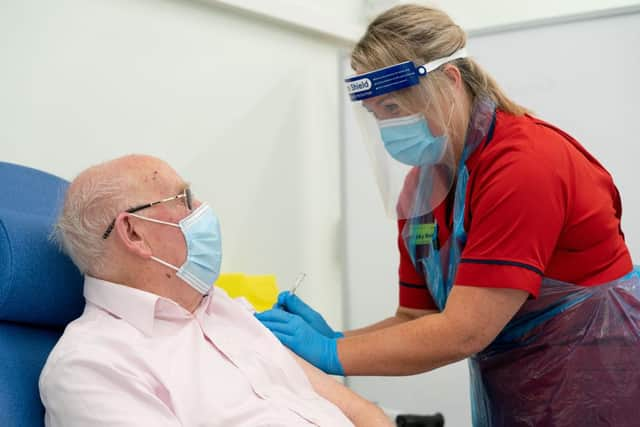Does the Covid vaccine work against new variants? What Oxford Astrazeneca, Pfizer and Moderna have said about new strains
A mutation has been found in samples of the new UK Covid-19 variant that could allow the virus to escape antibody protection, according to a report from Public Health England.
Members of the SAGE government advisory group have stated that the mutation, named E484K – and also identified in the South African and Brazilian strains – could still cause ill health in vaccinated people.
Advertisement
Hide AdAdvertisement
Hide AdBoris Johnson has imposed mandatory travel quarantines on anyone arriving from several countries where new variants are prevalent, but the new UK strain’s mutation could prove difficult to control.


This is what we know so far about how effective each vaccine is on the new Covid variant.
What are the new variants?
Coronavirus, like any virus, mutates as it develops and adapts inside the body.
A new UK variant - which has resulted in a large increase in Covid-19 cases and subsequent national lockdowns - was first recognised in Kent in September 2020 and is thought to have a 70% higher transmission rate.
The approved vaccines in the UK have proven sufficiently effective at immunising against the new strain, however a new mutation called E484K – which is a change in the spike protein – has been found in samples of the new variant could cause the virus to escape antibody protection.Other new strains detected in South Africa on 4 January, and on 14 January in Brazil, have also been found to carry the E484K mutation.
Professor Calum Semple, a member of the Scientific Advisory Group for Emergencies (Sage), told BBC radio on 3 February: "The mutation of most concern, which we call E484K, has also occurred spontaneously in the new Kent strain in parts of the country too.”
The government has already announced a mandatory hotel quarantine programme which is due to come into effect in the UK. The travel restrictions will include countries near Brazil, including for people travelling from Argentina, Brazil, Bolivia, Chile, Colombia, Ecuador, French Guiana, Guyana, Paraguay, Peru, Suriname, Uruguay and Venezuela.
How have new variants been brought into the UK?
UK Health Minister Matt Hancock previously stated that the foreign variants of the virus had only entered the UK through people who had arrived back from abroad.
Advertisement
Hide AdAdvertisement
Hide AdHowever, there have been 11 cases in Bristol and a cluster of 32 cases in Liverpool with no apparent link to international travel.
Hancock has stated the new variants "might have a lower response to the vaccine" but "we don't know the degree of that".
Do the UK-approved vaccines work against the new strains?
In initial trials the Moderna and Pfizer vaccines have been somewhat effective against the new E484K mutated strains, according to the companies producing either vaccine.
However, these tests were carried out on the South African strain, not the UK strain’s mutated version.
Moderna has reported that although there has been a six-fold reduction in the effectiveness of the vaccine against the South-African variant, a booster third dose could provide greater immunisation.
Previous research by Moderna proved the vaccine had no loss of effectiveness against the UK variant – but this was done before it the E484K mutation was discovered.
The research by Moderna against the new foreign variant was conducted by injecting the new variant into blood samples of people who had already received their two doses of the Moderna vaccine.
Results concluded the vaccine still had some effectiveness, but a third dose could have the potential to build a strong enough immune response to the new variant.
Advertisement
Hide AdAdvertisement
Hide AdDr. Tal Zaks, Moderna’s chief medical officer, said the company is producing a tweaked version of their vaccine, which would work as a booster shot.
He said: “We’re doing it today to be ahead of the curve, should we need to.
“I think of it as an insurance policy.”
Moderna’s claims that its vaccine could provide some immunity against the new strains are yet to be peer reviewed.
Research is still underway as to the effectiveness of a third dose.
The Pfizer BioNTech vaccine is also reported to be effective against the South African strain, though to a lesser degree than the initial coronavirus strain and the newer UK variant.
on 20 January, research carried out by Pfizer and BioNTech concluded “no biologically significant difference in neutralisation activity” between the variants, meaning the vaccine works against new variants as well.
This research was carried out using blood from 15 patients who had received both doses of the Pfizer BioNTech vaccine, the results have not been peer reviewed.
At present, the UK’s Oxford-AstraZeneca has not confirmed the effectiveness of its vaccine against the two new strains. However the Oxford University scientists and drugs company AstraZeneca are currently working on a vaccine that will be able to deal with the new strains and this is expected to be ready by autumn 2021.
Advertisement
Hide AdAdvertisement
Hide AdThe UK is currently vaccinating priority groups using the Pfizer and Oxford-AstraZeneca vaccines.
What if I have already received the Oxford-AstraZeneca vaccine?
It has not yet been determined how effective Oxford-AstraZeneca is in combating the South African variant or the new UK mutated strain.
However, scientists have previously stated that people should receive two doses of the same brand of vaccine, as there is not enough information about the percentage of effectiveness achieved when doses of different brands are used.
It is not yet known whether a third dose of Pfizer will be required to boost immunity against the new South African variant.
All companies are now working to determine their effectiveness against new strains.